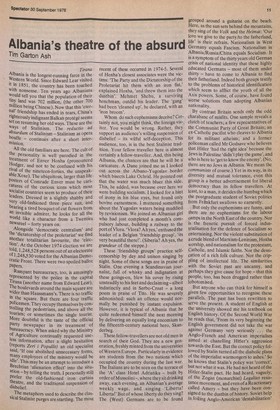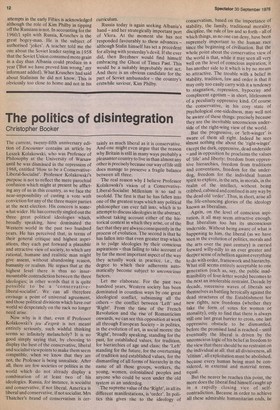Albania's theatre of the absurd
Tim Garton Ash
Tirana Albania is the longest-running farce in the Western World. Since Edward Lear visited it in 1851, the country has been touched With nonsense. Ten years ago Albanians would tell you that the population of their tiny land was 702 million, (the other 700 million being Chinese). Now that this 'eternal' friendship has ended in tears, China's righteously indignant Balkan protégé seems set on resuming her old ways. These are the ways of Stalinism. The red uctio ad absurdum of Stalinism — Stalinism as opera bouffe — continues after a short intermission.
All the old familiars are here. The cult of the personality is well parodied in the treatment of Enver Hoxha (pronounced }lodger, and not to be confused with his rival of the nineteen-forties, the unspeakable Xoxe). The ubiquitous, larger than life Posters of Comrade Enver must be caricatures of the curious icons which most socialist countries seem to produce of their leaden. Dressed in a slightly shabby and very old-fashioned three piece suit, and bearing a tired bouquet of cut flowers from an invisible admirer, he looks for all the world like a character from a Twenties newsreel — forty years on. Alongside `democratic centralism' and the `dictatorship of the proletariat' we find another totalitarian favourite, the 'election'. At the October 1974 election we are told, 1,248,528 persons out of an electorate of 1,248,530 voted for the Albanian Democratic Front. There were two spoiled ballot Papers.
Rampant bureaucracy, too, is amusingly represented by the police in the capital Tirana (another name from Edward Lear). The boulevards around the main square are Wider than Haussmann's. There is no traffic in the square. But there are four traffic Policemen. They occupy themselves by controlling the pedestrians, and above all the tourists; or sometimes the single tourist. More doubtful is the taste of the official Party newspaper in its treatment of bureaucracy. When asked why the Ministry of Agriculture continually requested useless information, after a slight hesitation (reports Zen i i Popullit) an old specialist said, 'If one abolished unnecessary forms, many employees of the ministry would be idle'. This may be an attempt to introduce a Brechtian 'alienation effect' into the situation — by telling the truth. I personally still prefer the old-fashioned iron curtain theatre, and the traditional suspension of disbelief.
The metaphors used to describe the classical Stalinist purges are startling. The most recent of these occurred in 1974-5. Several of Hoxha's closest associates were the victims: 'The Party and the Dictatorship of the Proletariat hit them with an iron fist,' explained Hoxha, 'and threw them into the dustbin'. Mehmet Shehu, a surviving henchman, outdid his leader. The 'gang' had been 'cleaned up', he declared, with an 'iron broom'.
Whom do such euphemisms deceive? Certainly not, you might think, the foreign visitor. You would be wrong. Rather, they support an audience's willing suspension of disbelief — its wilful self-deception. This audience, too, is in the best Stalinist tradition. Your fellow traveller here is almost certainly a fellow-traveller. And, this being Albania, the chances are that he will be a caricature. A Dane joined me as I looked out across the Albano-Yugoslav border which bisects Lake Ochrid. He pointed out that the water was much bluer this side. This, he added, was because over here we were building socialism. I looked fora hint of irony in his blue eyes, but found only bovine earnestness. I muttered something about the Yugoslav waters being muddied by revisionism. We joined an Albanian girl who had just completed a month's compulsory labour, building a railway to the port of Vlora. `Mora? Ah yes,' enthused the leader of a Belgian `friendship group', 'its very beautiful there. (Siberia? Ah yes, the grandeur of the steppe.) These 'friendship groups' practice selfcensorship by day and unison singing by night. Some of these songs are in praise of Stalin. One evening a Scandinavian journalist, full of whisky and indignation at these goings-on, blew his cover by rising unsteadily to his feet and declaiming —albeit indistinctly and in Serbo-Croat — a long poem in praise of Tito. He was severely admonished: such an offence would normally be punished by instant expulsion. However, it is typical of Albania that he quite redeemed himself the next morning by delivering an equally long encomium to the fifteenth-century national hero, Skanderbeg.
These fellow-travellers are not old men in search of their God. They are a new generation, freshly minted from the universities of Western Europe. Particularly in evidence are students from the two nations which occupied the country during the last war. The Italians are to be seen on the terrace ol the 'A' class Hotel Adriatika — built by order of Mussolini—, where they sit drinking away, each evening, an Albanian's average weekly wage, and singing `Liberta! Liberta!' But of whose liberty do they sing? The (West) Germans are to be found grouped around a guitarist on the beach. Here, as the sun sets behind the mountains, they sing of the Volk and the Heimat: 'Our love we give to the party/to the fatherland, life' is their refrain. Nationalism in West Germany equals Fascism. Nationalism in Albania/Russia/China equals Socialism. It is a symptom of the thirty years old German crisis of national identity that these highly educated Germans — most of them under thirty — have to come to Albania to find their fatherland. Indeed both groups testify to the problems of historical identification which seem to afflict the youth of all the Axis powers. Some, of course, have found worse solutions than adopting Albanian nationality.
By contrast Britain sends only the odd charabanc of misfits. One sample reveals a clutch of teachers; a few representatives of the Communist Party of Great Britain; an ex-Catholic pacifist who cleaves to Albania for its militant atheism; and a former policeman called Mr Godsave who believes that Hitler `had the right idea' because the Jews in Palestine 'didn't play the game', and who is here to `get to know the enemy'. (No, there are no Jews in Albania. We mean the communists of course.) Yet in its way, in its diversity and mutual tolerance, even this group is a better advertisement for liberal democracy than its fellow travellers. At least, to a man, it derides the humbug which the postgraduate student of Soviet politics from Ftlnkfurt swallows so earnestly.
But only the euphemisms are funny, and there are no euphemisms for the labour camps in the North East of the country. Nor is the frenetic pursuit of forced industrialisation for the defence of Socialism so entertaining. Nor the violent substitution of a crude blend of Marxism-Leninism, Hoxha worship, and nationalism for the protestant, Catholic, and Islamic faiths. Nor the dessication of a rich folk culture. Nor the crippling of intellectual life. The similarities with the Soviet past are uncanny, and perhaps they give cause for hope that this people, too, has been drugged rather than lobotom ised, But anyone who can think for himself is given few opportunities to recognise these parallels. The past has been rewritten to serve the present. A student of English at the university showed me his textbook on English history. Of the Second World War he reads that, 'From its very beginning the English government did not take the war against Germany very seriously . . . the Anglo-French and American imperialists aimed at chanelling Hitler's aggression towards the East. But the correct policy followed by Stalin turned all the diabolic plans of the imperialist warmongers to ashes.' So he knows that Stalin's policy was 'correct', but not what it was. He had not heard of the Hitler-Stalin pact. He had heard, vaguely, of the Zogist (monarchist) Legalitet resistance movement, and even of a Reactionary called Amery — but they have been consigned to the dustbin of history. Soviet help in foiling Anglo-American 'destabilisation' attempts in the early Fifties is acknowledged although the role of Kim Philby in tipping off the Russians is not. In accounting for the 1960/1 split with Russia, Kruschev is the great bogey-man. He is the subject of authorised 'jokes'. A teacher told me the one about the Soviet leader saying in 1958 that the Soviet Union consumed more grain in a day than Albania could produce in a year ('But we have proved him wrong,' my • informant added). What Kruschev had said about Stalinism he did not know. This is obviously too close to home and not in his curriculum.
Russia today is again seeking Albania's hand — and her strategically important port of Vlora. At the moment she has not responded favourably to these advances — although Stalin himself has set a precedent for allying with yesterday's devil. If she ever did, then Brezhnev would find himself embracing the Ghost of Times Past. This would be a suitably improbably next act. And there is an obvious candidate for the part of Soviet ambassador — the country's erstwhile saviour, Kim Philby.



































 Previous page
Previous page